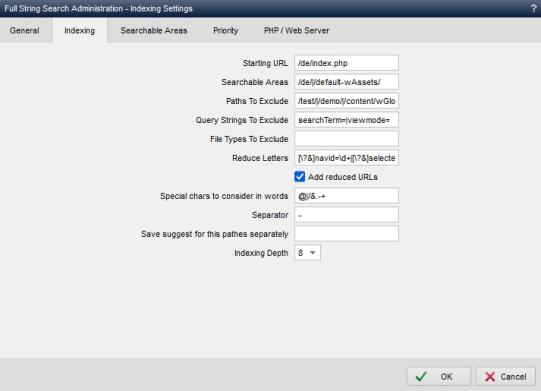Indexing settings - Indexing
In the settings of a search configuration, you can enter basic information on the indexing settings in the "Indexing" tab.

Operation
'Start URL':
In this field, enter the path where indexing should begin. All linked files are indexed recursively starting from this file.
The start URL is usually the start page of a site.
From version 005.058.042.000, you can also enter multiple start paths.
Separate multiple path entries with the pipe character |. The last entry must not end with a pipe character!
Example entry:
/base/index.php|/base-en/index.php
'Searchable areas':
In this field you can optionally enter a path to which indexing should be restricted.
In this way you can, for example, prevent another area linked above it (e.g. /base-en/index.php) from also being indexed for the start URL /base/index.php. In this case, enter /base/ here.
Please note that a path specification without a trailing slash includes all directories that begin with the specified character string(/base therefore searches /base/ and /basel/, for example).
Example entry:
/base/
'Paths to exclude':
In this field, you can optionally enter the paths that should not be included in the indexing. In this way, areas or files can be excluded from the search.
Separate multiple path entries with the pipe character |. The last entry must not end with a pipe character!
Please note the following marking:
The specification "/_vti" excludes all "_vti...." directories in the root directory, i.e. also "_vti_log".
The specification "/_vti/" excludes all "_vti" directories in the root directory, i.e. not "_vti_log".
The specification "//_vti/" only excludes the "_vti" directory directly at the top level (DocumentRoot), not "_vti" directories in subdirectories.
Example entry:
/base-en/|/base-en/news/basel.php|/base-fr/
'Query strings to exclude':
In this field, you can optionally enter the query strings that should not be included in the indexing.
Separate multiple strings with the pipe character |. The last entry must not end with a pipe character!
Please note the following marking:
The specification "view" excludes all "view..." strings, including "viewmode" (e.g. viewmode=print).
Example entry:
searchTerm=|viewmode|document
'File extensions to be excluded':
In this field, you can optionally enter the file extensions that should not be included in the indexing.
Separate multiple file extensions with the pipe character |. The last entry must not end with a pipe character!
Please note the following marking:
The entry "doc" excludes all "doc..." endings, including "docx".
Example entry:
doc|shtml
'Characters to be reduced':
In this field, you can optionally enter the characters that should be removed from the URL.
This allows you to have a page indexed but exclude all other links to the same page.
e.g: [\?&]navid=\d+
The page /verzeichnis/index.php is indexed, but the page /verzeichnis/index.php?navid=1234567 is not included.
If all pages with the query string are to be excluded, 'Query strings to exclude' must be used.
Separate multiple characters with the pipe character |. The last entry must not end with a pipe character! The use of regular expressions is possible.
Example entry:
[\?&]navid=\d+
'Add URLs reduced':
If this parameter is activated, a URL is also added to the search index in reduced form if it is only linked or already linked in the first hit with URL parameter.
(available from CMS version 008.000.117.000)
'Special characters to be included in words':
In this field, you can optionally enter the special characters that are to be taken into account within words during search indexing. Enter the special characters without separators, e.g. for the @ and pipe characters like this: @|
The following special characters are currently supported: @|/&.-+
A dollar sign at the beginning of a word is already supported by default.
Example search terms:
we@home , this & that , 1/2 , domain.tld , left|right , CMS license , this+that , $year
For further setting options, see below.
'Separator':
In this field, you can optionally enter the character that can be used to include compound words with all words in the search index.
With the separator "-", for example, Schiff-fahrt is written into the index as Schiff and fahrt, whereby Schifffahrt is only recorded as Schifffahrt ).
Example entry:
-
'Save search suggestions for the following directories separately':
In this field, you can optionally enter the directories for which search suggestions (searchSuggest) are to be saved separately. After a search index run, these separate search suggestions can be accessed via the wSearchSuggest.php query (e.g. via the settings of the search results list).
Separate multiple characters with the pipe character |. The last entry must not end with a pipe character!
Example:
/base/about-us|/base/history
'Depth of indexing':
Use this selection box to define the depth to which indexing should take place. This does not correspond to the directory depth, but to the depth at which the corresponding page is found via the link.
'User under which the robot logs in':
Via the selection ![]() , you can optionally specify a user for licensed personalized search that is used for indexing personalized files. You can use the recycle bin symbol
, you can optionally specify a user for licensed personalized search that is used for indexing personalized files. You can use the recycle bin symbol ![]() to delete an already entered user from the field.
to delete an already entered user from the field.
It is advisable to specify a user of the type administrator who has viewing rights for all files. In the search output itself, the viewing rights of the logged-in user are checked.
Further setting options:
- Dot at the beginning of the word
To do this, manually add the following tag within the wd:robot tag in xxx.wSearchBot.php:
<allowDotAtTheBeginningOfAWord active="1"/>


